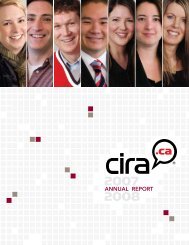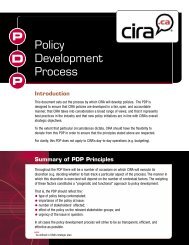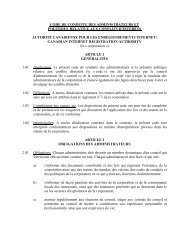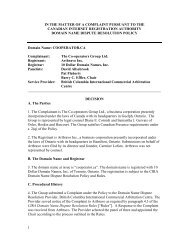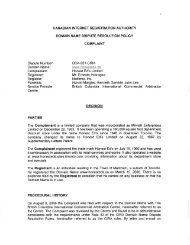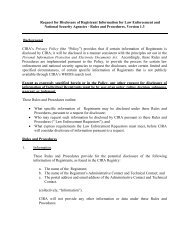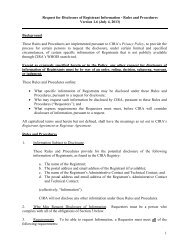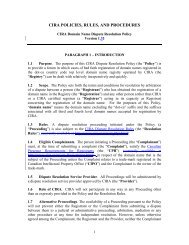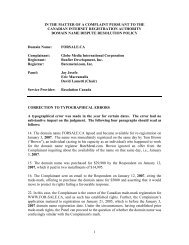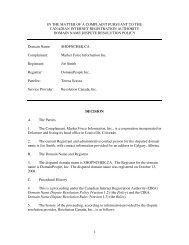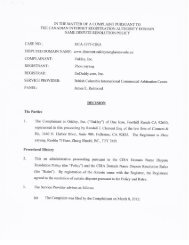DIRECTORS' CODE OF CONDUCT AND POLICY ON ... - CIRA
DIRECTORS' CODE OF CONDUCT AND POLICY ON ... - CIRA
DIRECTORS' CODE OF CONDUCT AND POLICY ON ... - CIRA
You also want an ePaper? Increase the reach of your titles
YUMPU automatically turns print PDFs into web optimized ePapers that Google loves.
DIRECTORS’ <strong>CODE</strong> <strong>OF</strong> <strong>C<strong>ON</strong>DUCT</strong> <strong>AND</strong><br />
<strong>POLICY</strong> <strong>ON</strong> C<strong>ON</strong>FLICTS <strong>OF</strong> INTEREST<br />
CANADIAN INTERNET REGISTRATI<strong>ON</strong> AUTHORITY/<br />
AUTORITÉ CANADIENNE POUR LES ENREGISTREMENTS INTERNET<br />
(the “Corporation”).<br />
SECTI<strong>ON</strong> 1<br />
GENERAL<br />
1.01 Application. This Directors’ Code of Conduct and Policy on Conflicts of Interest (the<br />
“Code”) has been approved by the board of directors (the “Board”) of the Corporation.<br />
The Code is intended to govern the conduct of Directors of the Corporation. It also sets<br />
out guidelines for avoiding and disclosing conflicts of interest.<br />
1.02 Definitions. Unless otherwise specified, the words and expressions used in this Code<br />
shall have the same meaning as in By-law No. 1 of the Corporation.<br />
1.03 Complement to By-laws, etc. The provisions of this Code are intended to complement<br />
and enhance in a consistent manner, the requirements that arise at law and in the By-laws<br />
of the Corporation.<br />
1.04 Interpretation. This Code shall be, unless the context otherwise requires, construed and<br />
interpreted in accordance with the interpretation provisions of the Corporation’s By-laws.<br />
SECTI<strong>ON</strong> 2<br />
DUTIES <strong>AND</strong> RESP<strong>ON</strong>SIBILITIES <strong>OF</strong> INDIVIDUAL DIRECTORS<br />
2.01 Responsibilities. Each Director is expected to become an active participant in a board<br />
that functions effectively as a whole. A Director is responsible to:<br />
(a)<br />
(b)<br />
(c)<br />
(d)<br />
Be informed of the constating documents and legislation under which the<br />
Corporation exists, its By-laws, mission, values, codes of conduct, and policies as<br />
they pertain to the duties of a Director;<br />
Keep generally informed about the activities of the Corporation and the local<br />
Internet community, and general trends in the sector(s) in which it operates;<br />
Attend Board meetings regularly, serve on committees of the Board and<br />
contribute from personal, professional and life experience to the work of the<br />
Board;<br />
Exercise, in the performance of their duties, the degree of care, diligence and skill<br />
required of a Director pursuant to the laws under which the Corporation is<br />
incorporated;
(e)<br />
(f)<br />
(g)<br />
(h)<br />
(i)<br />
(j)<br />
(k)<br />
(l)<br />
(m)<br />
(n)<br />
(o)<br />
Be independent and impartial;<br />
Not be influenced by self-interest, outside pressure, expectation of reward or fear<br />
of criticism;<br />
Act with honesty and integrity and conduct herself in a manner consistent with the<br />
nature and the responsibilities and the maintenance of public confidence in the<br />
conduct of the Board’s business;<br />
Offer her personal perspectives and opinions on issues that are the subject of<br />
Board discussion and decision;<br />
Voice, clearly and explicitly at the time a decision is being taken, any opposition<br />
to a decision being considered by the Board;<br />
Maintain solidarity with fellow Directors in support of a decision that has been<br />
made in good faith in a legally constituted meeting, by Directors in reasonably<br />
full possession of the facts;<br />
Ask the Directors to review a decision, if she has reasonable grounds to believe<br />
that the Board has acted without full information or in a manner inconsistent with<br />
its fiduciary obligations, and, if still not satisfied after such review, ask that the<br />
matter be placed before the membership;<br />
Work with the staff of the Corporation on committees or task forces of the Board;<br />
Know and respect the distinction in the roles of Board and staff consistent with<br />
the principles underlying these governance policies;<br />
Exercise vigilance for and declare any apparent or real personal conflict of<br />
interest in accordance with the Corporation’s By-laws and policies, and in<br />
particular with this Code; and<br />
Comply with all other codes and policies approved by the Board from time to<br />
time.<br />
2.02 Conduct of Directors. A Director will at all times conduct herself in a manner that:<br />
(a)<br />
(b)<br />
(c)<br />
(d)<br />
(e)<br />
Supports the objectives of the Corporation;<br />
Serves the overall best interests of the Corporation;<br />
Subordinates her personal interests, and those of any particular constituency, to<br />
the best interests of the Corporation;<br />
Brings credibility and goodwill to the Corporation;<br />
Respects principles of fair play and due process;
(f)<br />
(g)<br />
(h)<br />
(i)<br />
(j)<br />
(k)<br />
(l)<br />
Demonstrates respect for individuals and human rights;<br />
Respects and gives fair consideration to diverse and opposing viewpoints;<br />
Demonstrates due diligence and dedication in preparation for, and attendance at,<br />
meetings, special events and in all other activities on behalf of the Corporation;<br />
Demonstrates good faith, prudent judgement, honesty, transparency and openness<br />
in her activities on behalf of the Corporation;<br />
Ensures that the financial affairs of the Corporation are conducted in a responsible<br />
and transparent manner with due regard for her fiduciary responsibilities and<br />
public trusteeship;<br />
Avoids real or perceived conflicts of interest;<br />
Conforms with the By-laws and policies approved by the Board, in particular this<br />
Code and the Oath of Office and Confidentiality Agreement.<br />
SECTI<strong>ON</strong> 3<br />
C<strong>ON</strong>FLICT <strong>OF</strong> INTEREST GUIDELINES<br />
3.01 Integrity. These Conflict of Interest Guidelines are intended to ensure the highest<br />
standards and maintenance of the integrity of the Board. Directors shall act at all times in<br />
the best interests of the Corporation rather than in the interests of particular<br />
constituencies. This means putting the interests of the Corporation ahead of any personal<br />
interest or the interest of any other person or entity. It also means performing her duties<br />
and transacting the affairs of the Corporation in such a manner that promotes public<br />
confidence and trust in the integrity, objectivity and impartiality of the Board.<br />
3.02 No Pecuniary Benefit.<br />
(a)<br />
(b)<br />
No Director shall directly or indirectly receive any profit from her position as<br />
such, provided that, notwithstanding anything herein contained to the contrary,<br />
Directors may receive reasonable payment for their services and reimbursement<br />
for reasonable expenses incurred by them in the performance of their duties as<br />
permitted in the By-laws and approved by the Board.<br />
The pecuniary interests of immediate family members (including the immediate<br />
family members of a Director’s partner) or close personal or business associates<br />
of a Director are considered to also be the pecuniary interests of the Director.<br />
3.03 Definition of Conflict of Interest.<br />
(a)<br />
A conflict of interest refers to situations in which personal, occupational or<br />
financial considerations may affect, or appear to affect, a Director’s objectivity,<br />
judgment or ability to act in the best interests of the Corporation and includes<br />
conflicts as described in subsection 3.04 hereof.
(b)<br />
(c)<br />
(d)<br />
(e)<br />
(f)<br />
A conflict of interest may be real, potential or perceived in nature.<br />
A real conflict of interest arises where a Director has a private or personal<br />
interest, for example, a close family connection or financial interest.<br />
A potential conflict of interest may arise when a Director has a private or personal<br />
interest such as an identified future commitment.<br />
A perceived or apparent conflict of interest may exist when a reasonable, wellinformed<br />
person has a reasonable belief that a Director has a conflict of interest,<br />
even if there is no real conflict.<br />
Full disclosure, in itself, does not remove a conflict of interest.<br />
3.04 Examples of Conflict of Interest on the Part of a Director.<br />
The following examples constitute Conflicts of Interest under this Code:<br />
(a)<br />
(b)<br />
(c)<br />
(d)<br />
(e)<br />
Any circumstance that may result in a personal or financial benefit to a Director<br />
or his family, business associate or friend. This includes, but is not limited to,<br />
accepting any payment for services rendered to the Corporation other than<br />
payment for services of a Director as permitted in this Code, including contracted<br />
work or honoraria; or accessing financial or other resources for personal use, i.e.<br />
transportation, training costs, supplies, equipment, etc.<br />
Personal interests which conflict with the interests of Members of the Corporation<br />
or are otherwise adverse to the interests of the Corporation.<br />
Seeking, accepting or receiving any personal benefit from a supplier, vendor or<br />
any individual or organization doing or seeking business with the Corporation.<br />
Being a member of the board or staff of another Person which might have<br />
material interests that conflict with the interests of the Corporation or its<br />
Members; and, dealing with matters on one board which might materially affect<br />
the other board.<br />
Any involvement in the hiring, supervision, grievance, evaluation, promotion,<br />
remuneration or firing of a family member, business associate, or friend of the<br />
Director.<br />
3.05 Principles for Dealing with Conflict of Interest.<br />
(a)<br />
(b)<br />
Both prior to serving on the Board and during their term of office, Directors must<br />
openly disclose a potential, real or perceived conflict of interest as soon as the<br />
issue arises and before the Board or its committees dealing with the matter at<br />
issue.<br />
If the Director is not certain whether she is in a conflict of interest position, the
matter may be brought before the Chair of the Board, the Executive Committee or<br />
the Board for advice and guidance.<br />
(c)<br />
(d)<br />
(e)<br />
(f)<br />
If there is any question or doubt about the existence of a real or perceived conflict,<br />
the Board will determine by majority vote if a conflict exists. The Director<br />
potentially in conflict of interest shall be absent from the discussion and shall not<br />
vote on the issue.<br />
It is the responsibility of other Directors who are aware of a real, potential or<br />
perceived conflict of interest on the part of a fellow Director to raise the issue for<br />
clarification, first with the Director in question and, if still unresolved, with the<br />
Chair of the Board.<br />
The Director must abstain from participation in any discussion on the matter, shall<br />
not attempt to personally influence the outcome, shall refrain from voting on the<br />
matter and, unless otherwise decided by the Board, must leave the meeting room<br />
for the duration of any such discussion or vote.<br />
The disclosure and decision as to whether a conflict exists shall be duly recorded<br />
in the minutes of the meeting. The time the Director left and returned to the<br />
meeting shall also be recorded.<br />
3.06 Gifts and Hospitality. Directors shall not directly or indirectly offer or accept cash<br />
payments, gifts, gratuities, privileges or other personal rewards, which are intended to<br />
influence the activities or affairs of the Corporation. Directors may, however, give or<br />
receive modest gifts or hospitality as a matter of general and accepted business practice,<br />
provided the foregoing does not include cash or other negotiable instruments and<br />
provided further proper accounting of any such expenses is made.<br />
4.01 General<br />
SECTI<strong>ON</strong> 4<br />
COMPLAINTS <strong>AND</strong> DISPUTES INVOLVING DIRECTORS<br />
(a)<br />
(b)<br />
(c)<br />
In this section 4, the “Committee” shall mean the Complaints Committee.<br />
The Committee shall be constituted of 3 Directors, other than the Chair of the<br />
Board and members of the Executive Committee, who shall be appointed from<br />
time to time by the Board.<br />
Any complaints that a Director has violated any provision of the Corporation’s<br />
By-laws or any policies approved by the Board, in particular the attached Oath of<br />
Office and Confidentiality Agreement, shall be referred to the process set out in<br />
subsections 4.04 to 4.06, and shall not be dealt with under any process unless the<br />
Complainant (except where clause 4.04(c)(ii) applies), the Complainee, the<br />
Adviser and the Committee agree. However, nothing herein shall preclude a<br />
Complainant from seeking legal recourse before a court, tribunal or commission.
(d)<br />
(e)<br />
Any disputes between Directors that interfere with the ability of the Board to<br />
carry on its affairs shall be referred to the process set out in subsection 4.02. If<br />
such a dispute arises out of an allegation that a Director has violated a provision<br />
of the Corporation’s By-laws or any policies approved by the Board, such<br />
allegation shall be dealt with in accordance with subsections 4.04 to 4.06 before<br />
the dispute is dealt with under subsection 4.02.<br />
Subject to Allegations of illegal activity involving a Director shall be immediately<br />
referred to appropriate authorities for investigation. Any Director against whom<br />
such allegations are made shall take a leave of absence from the Board pending<br />
completion of the investigation.<br />
4.02 Disputes Between Directors<br />
(a)<br />
(b)<br />
(c)<br />
(d)<br />
(e)<br />
(f)<br />
The Committee, in a meeting duly called for the purpose, shall review any<br />
disputes as described in paragraph 4.01(d).<br />
The review of such dispute shall include an opportunity for the Directors<br />
concerned to present their respective positions.<br />
Members of the Committee or of the Board who originate or are the subject of<br />
such disputes must declare their conflict and recuse themselves from such<br />
Committee or Board deliberations, meetings and decisions (but shall nonetheless<br />
be counted as part of the quorum of the Committee or the Board, as applicable).<br />
Every attempt should be made to resolve such matters expeditiously and fairly.<br />
The recommendations regarding resolution of such matters shall be brought to the<br />
Board for approval.<br />
The ruling of the Board shall be final.<br />
4.03 Advisers<br />
(a)<br />
(b)<br />
(c)<br />
(d)<br />
The General Counsel of the Corporation is hereby appointed to serve as Adviser<br />
under this Code and may be replaced in his/her role as Adviser at any time by the<br />
Executive Committee. The role of Adviser shall not be left vacant.<br />
In carrying out his/her duties under this Code, the Adviser will be directly<br />
responsible to the Executive Committee.<br />
The Corporation will arrange for the Adviser to receive appropriate initial training<br />
as well as other institutional support and assistance in carrying out his/her<br />
responsibilities under this Code.<br />
The Adviser will maintain separate confidential files of all documentation and/or<br />
notes generated for each complaint received, whether verbal or written, under this<br />
Code. The Adviser and, where appropriate, members of the Committee may have
access to those records as needed and the Committee has discretion to decide any<br />
other necessary access to specific files.<br />
(e)<br />
In the event that the Adviser is in any way personally involved with the facts<br />
giving rise to the complaint or the investigation, that Adviser is excused from all<br />
his or her responsibilities as an Adviser for that complaint only and the Executive<br />
Committee will appoint another person to serve as Adviser in respect of the<br />
complaint.<br />
4.04 Reporting Process.<br />
(a)<br />
(b)<br />
Initial Action. An individual (the "Complainant") who has reason to believe that<br />
a Director (the “Complainee”) is in violation of this Code is encouraged to bring<br />
the matter to the attention of the Complainee. Where the Complainant does not<br />
wish to bring the matter directly to the attention of the Complainee, or where such<br />
an approach is attempted and does not produce a satisfactory result, the<br />
Complainant should seek the advice of the Adviser.<br />
Meeting with the Adviser. The Adviser will provide a copy of the Code to the<br />
Complainant and advise the Complainant of:<br />
(i)<br />
(ii)<br />
(iii)<br />
The right to lay a formal written complaint under this Code;<br />
The right to withdraw from any further action in connection with the<br />
complaint at any stage (even though the Corporation may continue to<br />
investigate the complaint);<br />
The time limits which apply to this Code and which may apply to such<br />
other avenues of recourse.<br />
(c)<br />
Outcomes to Meeting with Adviser. There are three possible outcomes following a<br />
complaint to the Adviser:<br />
(i)<br />
(ii)<br />
Where the Complainant and Adviser agree that the conduct does not<br />
constitute a violation of this Code: If the Complainant and the Adviser,<br />
after discussing the matter, agree that the conduct in question does not<br />
constitute a violation of this Code, the Adviser will take no further action.<br />
Where the Complainant brings evidence of prima facie violation of the<br />
Code but does not wish to lay a formal written complaint: It may happen<br />
that a Complainant (or a third party) brings to the attention of the Adviser<br />
facts which constitute prima facie evidence of a violation of the Code but,<br />
after discussion with the Adviser, the Complainant decides not to lay a<br />
formal written complaint. In that event, the following steps may be taken:<br />
(A)<br />
The Adviser may speak to the Complainee with a view to<br />
obtaining an assurance from the Complainee that the conduct<br />
complained of will not be repeated; but thereafter proceed no
further; or<br />
(B)<br />
The Adviser may decide to lay a formal complaint if the Adviser<br />
concludes that the evidence and the surrounding circumstances are<br />
such as to require the laying of a formal complaint. In that event,<br />
the Adviser will:<br />
I<br />
II<br />
III<br />
issue a formal written complaint signed by the Adviser;<br />
provide a copy of the complaint, without delay, to the<br />
Complainee and the Complainant; and<br />
provide a copy of the complaint, without delay, to the<br />
Committee for review.<br />
The Committee will review the complaint and determine whether<br />
an investigation will be undertaken under subsection 4.05 hereof.<br />
(iii)<br />
Where the Complainant decides to lay a formal complaint: If the<br />
Complainant, after meeting with the Adviser, decides to lay a formal<br />
complaint, including the situation where the Adviser is of the view that the<br />
conduct in question does not constitute a violation of the Code, the<br />
Adviser will:<br />
(A)<br />
(B)<br />
(C)<br />
assist the Complainant with the drafting of a formal written<br />
complaint, which must be signed by the Complainant;<br />
provide a copy of the complaint, without delay, to the Complainee<br />
and to the Complainant; and<br />
without delay, file the complaint with the Committee.<br />
4.05 Investigative Process.<br />
(a)<br />
Where a complaint is filed with the Committee, the Committee shall examine the<br />
complaint and follow one of the following courses of action:<br />
(i)<br />
(ii)<br />
(iii)<br />
Decide that there is not enough information to proceed, and either conduct<br />
its own investigation into the complaint (subject to paragraph 4.05(b)) or<br />
appoint an investigator independent of the Corporation to investigate the<br />
complaint. The Committee or the investigator, as applicable, shall provide<br />
a report on its or his/her findings;<br />
Decide that there is enough information in the complaint to proceed, and<br />
commence the adjudicative process in subsection 4.06; or<br />
Decide that, the facts included in the complaint do not give rise to<br />
violation of the Code, and dismiss the complaint.
(b)<br />
(c)<br />
An investigation under paragraph 4.05(a)(i) can only be conducted by the<br />
Committee where the facts are not in dispute and the consent of the Complainant,<br />
the Complainee, the Adviser and the Committee have been given in writing.<br />
In the event the matter is investigated pursuant to paragraph 4.05(a)(i), once the<br />
report of the investigation is completed, the Committee shall consider such report<br />
and the complaint and follow one of the following courses of action:<br />
(i)<br />
Decide that there is no violation of the Code and dismiss the complaint; or<br />
(ii) Commence the adjudicative process in subsection 4.06.<br />
(d)<br />
Where the Committee commences the adjudicative process in subsection 4.06 it<br />
shall compose a report to be provided to the Board with the complaint and, if<br />
applicable, the investigator's report. The Committee’s report shall include:<br />
(i)<br />
(ii)<br />
(iii)<br />
(iv)<br />
(v)<br />
A summary of the facts giving rise to the complaint;<br />
A summary of the positions of the Complainant and the Complainee;<br />
A summary of the investigator's or the Committee’s report of<br />
investigation, if applicable;<br />
The Committee’s analysis of the complaint and the facts as they relate to<br />
the alleged violation(s) of this Code; and<br />
Recommendations with respect to the action the Board should take.<br />
(e)<br />
Recommendations made under paragraph 4.05(d)(v) may include, without<br />
limitation, any one or more of the following:<br />
(i)<br />
(ii)<br />
(iii)<br />
(iv)<br />
(v)<br />
(vi)<br />
(vii)<br />
A dismissal of the complaint;<br />
A letter of reprimand from the Board to the Complainee;<br />
Oral censure of the Complainee before the Board;<br />
Oral censure of the Complainee before the <strong>CIRA</strong> members at a meeting of<br />
members;<br />
Public censure of the Complainee posted on the <strong>CIRA</strong> website;<br />
Removal of the Complainee as a Director of the Corporation;<br />
Removal of the Complainee as an Officer of the Corporation;<br />
(viii) Such other recommendation(s) as the Committee shall consider advisable<br />
having regard to the facts and the gravity of the violation(s) of the Code,<br />
as applicable.
4.06 Adjudicative Process.<br />
(a)<br />
(b)<br />
(c)<br />
(d)<br />
(e)<br />
(f)<br />
A hearing by the Board shall be held when the Committee forwards the complaint<br />
to the Board for further review in accordance with subsection 4.05.<br />
The Board will name a place and time for the hearing.<br />
Subject to subsection 4.06(d), the Board hearing will be held as soon as<br />
practicable but not later than twenty eight (28) days after the Board receives the<br />
written notice from the Committee.<br />
The Board may extend the time for the hearing date if it is considered appropriate.<br />
The Board will give written notice of the hearing to the Complainee and to the<br />
Committee at least seven (7) days before the hearing date.<br />
The notice of the Board hearing will include:<br />
(i)<br />
(ii)<br />
(iii)<br />
(iv)<br />
(v)<br />
(vi)<br />
the place and time of the hearing;<br />
the purpose of the hearing;<br />
a statement that the Complainee will be afforded an opportunity to<br />
examine prior to the hearing, any written or documentary evidence that<br />
will be produced, or any reports the contents of which will be given in<br />
evidence at the hearing;<br />
a statement that the Complainee may proceed in person or be represented<br />
by counsel, call witnesses and tender documents in evidence in support of<br />
his or her case;<br />
a statement that the time for the hearing may be extended by the Board on<br />
the application of any party; and<br />
a statement that if the Complainee does not attend the meeting, the Board<br />
may proceed in the absence of the Complainee, and the Complainee will<br />
not be entitled to any further notice in the hearing.<br />
(g)<br />
(h)<br />
(i)<br />
The parties to the Board hearing are the Complainee, the Committee, the<br />
Complainant, the Adviser and such other person or persons as the Board may<br />
specify.<br />
The Complainee and any other parties to the Board hearing shall be afforded an<br />
opportunity to examine, prior to the hearing, any written or documentary evidence<br />
that will be produced, or any reports the contents of which will be used in<br />
evidence.<br />
Members of the Board holding the hearing will not have taken part in any
investigation or consideration of the subject matter of the hearing. A Director who<br />
originates the complaint or is the subject of such complaint must declare his/her<br />
conflict and recuse him/herself from the Board deliberations, meetings and<br />
decisions (but shall nonetheless be counted as part of the quorum of the Board.<br />
Furthermore, members of the Board holding the hearing will not communicate<br />
directly or indirectly in relation to the subject matter of the hearing with any<br />
person or with any party or their representative, except upon notice to all parties<br />
and where an opportunity is given to all parties to participate.<br />
(j)<br />
(k)<br />
(l)<br />
(m)<br />
(n)<br />
(o)<br />
The Board may obtain legal advice.<br />
The findings of fact of the Board pursuant to a hearing will be based exclusively<br />
on evidence admissible, or matters that that a tribunal may take notice of, under<br />
the Statutory Powers Procedure Act (Ontario).<br />
No member of the Board will participate in a decision of the Board pursuant to a<br />
hearing unless they are present throughout the hearing and heard the evidence and<br />
argument of the parties and, except with the consent of the parties, no decision of<br />
the Board will be given unless all members so present participate in the decision.<br />
The Board shall make a decision to follow, amend or not follow the<br />
recommendation of the Committee. The Board, in making its decision, shall take<br />
into account the evidence presented before it, the recommendation(s) of the<br />
Committee, the Code itself, and such other considerations it, in its discretion,<br />
considers relevant.<br />
A written copy of the decision of the Board will be provided to the Complainee,<br />
the Complainant, if applicable, and the Committee.<br />
Service of a notice to the parties may be made personally or by registered mail<br />
addressed to the person to be served at their last known address and, where notice<br />
is served by registered mail, it will be deemed that the notice was served on the<br />
third (3rd) day after the day of mailing unless the person to be served establishes<br />
that they did not, acting in good faith, through absence, accident, illness or other<br />
causes beyond their control, receive it until a later date.<br />
SECTI<strong>ON</strong> 5<br />
C<strong>ON</strong>FIDENTIALITY<br />
5.01 Confidential Information. It is the responsibility of Directors to know what information<br />
is confidential and to obtain clarification when in doubt. Except as she may be compelled<br />
by applicable legal process, a Director must, both while having and after ceasing to have<br />
that status, treat as confidential all information regarding the policies, internal operations,<br />
systems, business or affairs of the Corporation obtained by reason of her status as a<br />
Director and not generally available to the public. A Director shall not use information<br />
obtained as a result of her involvement on the Board for her personal benefit. Each<br />
Director shall avoid activities which may create appearances that she has benefited from<br />
confidential information received during the course of her duties as a Director.
5.02 Review of Code. Each Director, forthwith after being elected, shall meet with the<br />
Corporation’s in-house legal counsel or, in his absence, with the President and CEO, to<br />
review this Code and such other policies of the Corporation that apply to Directors.<br />
5.03 Oath of Office and Confidentiality Agreement. Each Director is required to sign and<br />
agree to comply with the Oath of Office and Confidentiality Agreement, in the form<br />
attached hereto as Schedule “A”.
Schedule “A”<br />
Oath of Office and Confidentiality Agreement<br />
I, _____________________________, a Director of CANADIAN INTERNET<br />
REGISTRATI<strong>ON</strong> AUTHORITY/AUTORITÉ CANADIENNE POUR LES<br />
ENREGISTREMENTS INTERNET, declare that I have read, understood and agree to<br />
comply with the Corporation’s Code of Conduct, Policy on Conflicts of Interest and other<br />
applicable policies, and that in carrying out my duties as a Director, I will:<br />
1. Exercise the powers of my office and fulfil my responsibilities honestly, in good faith<br />
and in the best interests of the Corporation.<br />
2. Exercise these responsibilities, at all times, with due diligence, care and skill in a<br />
reasonable and prudent manner.<br />
3. Respect and support the Corporation’s By-laws, policies, Code of Conduct, Policy on<br />
Conflicts of Interest and decisions of the Board of Directors and Membership.<br />
4. Keep confidential all information unless the Board of Directors determines that such<br />
information is public. This shall include, but not be limited to, information about<br />
personnel, trade-secrets, any personal information, and matters dealt with during incamera<br />
meetings of the Board of Directors.<br />
5. Conduct myself in a spirit of collegiality and respect for the collective decisions of the<br />
Board of Directors and subordinate my personal interests to the best interests of the<br />
Corporation.<br />
6. Immediately declare any personal conflict of interest that may come to my attention.<br />
7. Comply with decisions of the Board of Directors made pursuant to the Corporation’s<br />
Code of Conduct.<br />
Signature: ____________________________ Date: _______________________<br />
Witness: ____________________________ Date: _______________________<br />
Schedule “A”


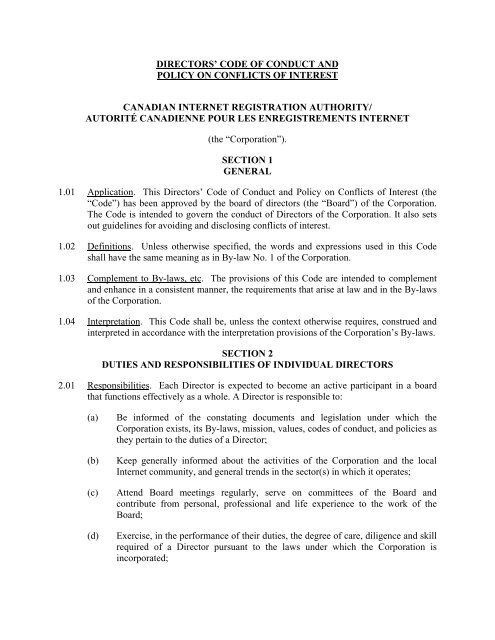
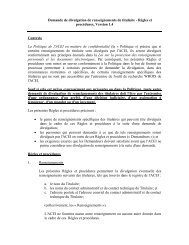
![Communiqu] - CIRA](https://img.yumpu.com/46419372/1/190x245/communiqu-cira.jpg?quality=85)
